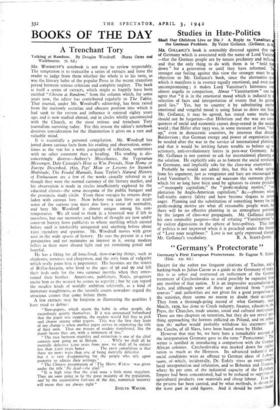BOOKS OF THE DAY
A Trenchant Tory
MR. WOODRUFF'S notebook is not easy to review respectably. The temptation is to transcribe a series of extracts and leave the reader to judge from them whether the whole is to his taste, as was the literary habit of the popular Press in the recent transition period between serious criticism and complete neglect. The book is itself a series of extracts, which might as happily have been entitled "Chosen at Random," from the column which, for some years now, the editor has contributed regularly to The Tablet. That journal, under Mr. Woodruff's editorship, has been raised from the narrowly sectarian and obscure position into which it had sunk to the esteem and influence it enjoyed eighty years ago, and is now studied abroad, and in circles wholly unconnected with the Church, as the most serious and trenchant Tory journalism surviving today. For this reason the editor's notebook deserves tonsideration for the illumination it gives on a rare and valuable mind.
It is essentially a personal compilation. Mr. Woodruff has jotted down curious facts from his reading and observation, some- times as the text for a witty paragraph of reflection, sometimes with no other comment than a heading. His reading is dis- concertingly diverse—Aubrey's Miscellanies, the Vegetarian Messenger Dale Carnegie's How to Win Friends, Near Home or Europe Messenger, r85o, Pigs' Meat or Lessons for Swinish Multitude, The Feudal Manuals, Isaac Taylor's Natural History of Enthusiasm are a few of the works casually referred to as though they were the normal currency of the literary market, and his observation is made in circles insufficiently explored by the educated classes—the terra incognita of the public banquet and the provincial study circle. From these voyages he returns deep- laden with curious lore. Now before you can have an acute sense of the curious you must also have a sense of normality, and here Mr. Woodruff is almost unique among his con- temporaries. We all tend to think in a historical way if left to ourselves, but our memories and habits of thought are now under consvint battery from publicists to whom anything which existed before 1918 is intolerably antiquated and anything before about 1500 legendary and spurious. Mr. Woodruff moves with great ease in the wide spaces of history. He sees the present in a vast perspective and yet maintains an interest in it, seeing modern follies in their most absurd light and yet remaining genial and hopeful.
He has a liking for all long-lived, slow-moving things, such as
elephants, tortoises and clergymen, and the only form of vulgarity which really pains him is impatience. His heroines are the sisters of Brillat-Savarin, who lived to the ages of 98 and 99 and left their beds only for the two summer months when they enter- tained their brother. Americans, publishers, Nazis, go-getters excite him to the nearest he comes to asperity ; but he can regard the steadier kinds of worldly ambition tolerantly, as a kind of immature naughtiness,, as the juvenile courts nowadavc regard the atrocious crimes that come before them.
A few extracts may be forgiven as illustrating the qualities I have tried to define: "Newspapers, which resent the habit in other people, die
exceedingly quietly themselves. If it was announced beforehand that the paper was stopping, the readers would feel free to pick and choose among other papers. This way the first they learn of any change is when another paper arrives imorporating the title of their own. Thus are masses of readers transferred, like the dumb beasts they are, with a minimum of loss."
"The race between stupidity and extinction is one of the chief contests now going on in Britain. . . . While we shall all be mentally defective 3,000 years from now, we shall all be extinct
less than 2.000 years hence . . The great consolation is that there are more ways than one of being mentally defective . but It is very disappointing for the people who rely upon posterity to admire their writings." "The Chinese presentation of The Merry Widow' was given under the title 'He dead—she glad.'"
"It is high time that the ared were a little more truculent. They are soon going to be the great majority of the population, and by the quantitative fashions of the day, numerical majority will mean they are always right " EVELYN WAUGH.


























 Previous page
Previous page